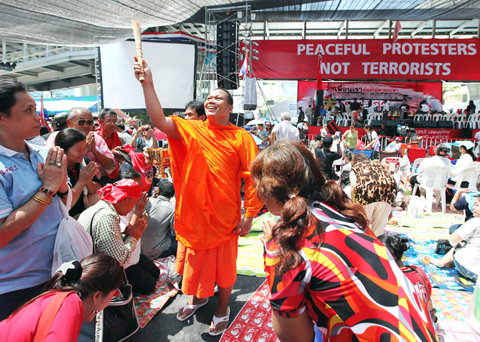Thailand’s pro-establishment “Yellow Shirts” yesterday called for the imposition of martial law to end mass anti-government protests by the rival “Red Shirts,” warning they may take action themselves.
The Reds were on alert for a crackdown by the security forces on their fortified camp in the heart of Bangkok, where tensions remained high after a grenade attack late on Sunday on the house of a former prime minister injured 11 people.
Twenty-six people have died and almost 1,000 have been injured in the capital this month in Thailand’s bloodiest civil violence in almost two decades, despite a state of emergency in Bangkok and surrounding areas.

PHOTO: EPA
The Yellows, formally known as the People’s Alliance for Democracy (PAD), have said they will take action to “protect the country” if authorities do not deal with the thousands of anti-government Red-Shirt protesters.
A one-week deadline set by the Yellows for an end to the crippling protests expired with no end in sight and the movement called on its supporters to begin their own peaceful demonstrations.
“The prime minister knows well that in this situation military measures are needed because it was hard to resolve it through politics,” said Suriyasai Katasila, spokesman for the Yellow Shirts’ New Politics Party.
“There should be an announcement of martial law,” he said. “If the situation does not improve, PAD will consider intensifying its measures.”
Thai Prime Minister Abhisit Vejjajiva has rejected an offer by the Reds, who mostly support former prime minister Thaksin Shinawatra, to disperse if elections are held in three months’ time — softening earlier demands for snap polls.
Appearing on national television on Sunday alongside his army chief, Abhisit vowed to retake the sprawling protest site that has paralyzed Bangkok’s main retail district, but gave no indication of when a crackdown might come.
Thailand is largely split between the mainly rural poor and urban working class Reds, and the Yellows who staged their own street protests that heralded a 2006 coup ousting their enemy Thaksin.
Yellow protesters in 2008 blockaded Bangkok’s two airports, before a controversial court verdict removed Thaksin’s allies and allowed a parliamentary vote that brought in the current government.
The Yellows had remained largely silent since the Reds began mass rallies last month demanding immediate elections, but there are now growing fears of clashes between the rival groups.
The anti-government movement remained as defiant after another night passed with no sign of a crackdown on their base, which has been fortified with barricades made from piles of truck tires and sharpened bamboo poles.
“If Abhisit fails to crack down on us, he will have to leave office,” said one of the Reds’ leaders, Nattawut Saikuar.
If he succeeds in breaking up the protests, the Reds will rally across the country and prepare for a return to the capital, he said.
Many of the anti-government protesters have begun shedding their trademark red clothing and wearing other colors to make themselves harder to identify.

POLITICAL PATRIARCHS: Recent clashes between Thailand and Cambodia are driven by an escalating feud between rival political families, analysts say The dispute over Thailand and Cambodia’s contested border, which dates back more than a century to disagreements over colonial-era maps, has broken into conflict before. However, the most recent clashes, which erupted on Thursday, have been fueled by another factor: a bitter feud between two powerful political patriarchs. Cambodian Senate President and former prime minister Hun Sen, 72, and former Thai prime minister Thaksin Shinawatra, 76, were once such close friends that they reportedly called one another brothers. Hun Sen has, over the years, supported Thaksin’s family during their long-running power struggle with Thailand’s military. Thaksin and his sister Yingluck stayed

In the sweltering streets of Jakarta, buskers carry towering, hollow puppets and pass around a bucket for donations. Now, they fear becoming outlaws. City authorities said they would crack down on use of the sacred ondel-ondel puppets, which can stand as tall as a truck, and they are drafting legislation to remove what they view as a street nuisance. Performances featuring the puppets — originally used by Jakarta’s Betawi people to ward off evil spirits — would be allowed only at set events. The ban could leave many ondel-ondel buskers in Jakarta jobless. “I am confused and anxious. I fear getting raided or even

Kemal Ozdemir looked up at the bare peaks of Mount Cilo in Turkey’s Kurdish majority southeast. “There were glaciers 10 years ago,” he recalled under a cloudless sky. A mountain guide for 15 years, Ozdemir then turned toward the torrent carrying dozens of blocks of ice below a slope covered with grass and rocks — a sign of glacier loss being exacerbated by global warming. “You can see that there are quite a few pieces of glacier in the water right now ... the reason why the waterfalls flow lushly actually shows us how fast the ice is melting,” he said.

Residents across Japan’s Pacific coast yesterday rushed to higher ground as tsunami warnings following a massive earthquake off Russia’s far east resurfaced painful memories and lessons from the devastating 2011 earthquake and nuclear disaster. Television banners flashed “TSUNAMI! EVACUATE!” and similar warnings as most broadcasters cut regular programming to issue warnings and evacuation orders, as tsunami waves approached Japan’s shores. “Do not be glued to the screen. Evacuate now,” a news presenter at public broadcaster NHK shouted. The warnings resurfaced memories of the March 11, 2011, earthquake, when more than 15,000 people died after a magnitude 9 tremor triggered a massive tsunami that